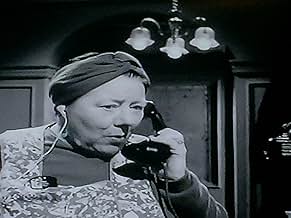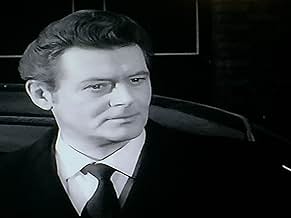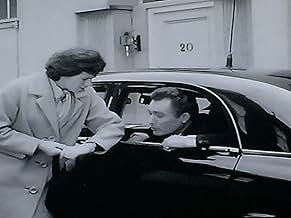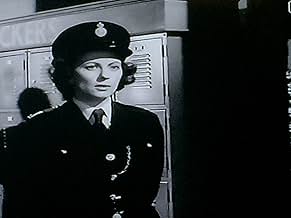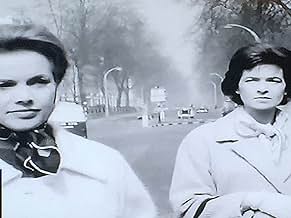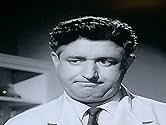Scotland Yard investigate when a woman, apparently the estranged wife of a London painter, is murdered with a shotgun in rural Surrey at the same time as the artist's striking model with her... Read allScotland Yard investigate when a woman, apparently the estranged wife of a London painter, is murdered with a shotgun in rural Surrey at the same time as the artist's striking model with her long black hair disappears.Scotland Yard investigate when a woman, apparently the estranged wife of a London painter, is murdered with a shotgun in rural Surrey at the same time as the artist's striking model with her long black hair disappears.
Frank Pettitt
- Fred
- (as Frank Pettit)
Reginald Hearne
- Doctor
- (as Reggie Hearne)
Featured reviews
The film opens with a woman being shot dead. The victim is assumed to be Ann Rogers, the owner of the cottage in which the body is found, and the prime suspect is her estranged husband, an artist named Howard Rogers. Although Howard claims to have an alibi, he also has an obvious motive to want his wife dead. He has been having an affair with his model, Serena Vaughan, but Ann, a devout Catholic, has refused to grant him the divorce he would need to marry Serena.
And then the situation is turned upside down by a series of coups de cinema. Taken to identify the body, Howard claims it is not that of his wife, and Ann suddenly turns up alive and well, saying that she wants a reconciliation with her husband. Howard produces a witness who can support his alibi, and Ann tells the police that the murdered woman was Claire Matthews, a friend who was staying with her and was presumably killed by mistake for Ann herself. Suspicion now shifts to Serena Vaughan, who is missing. There is, however, to be one more devastating plot twist.
"Serena" was originally made in black-and-white as a B-movie, which explains its brevity, little more than an hour in length. Yet it is an intriguing, well-plotted murder mystery which keeps the audience guessing about who we can trust and which information we can take at face value. Although it was made as long ago as 1962, it still turns up regularly on British television, a testament to its durability. 7/10
A goof. The police officer investigating the crime holds the rank of Detective Chief Inspector, but after he shows his identity badge to a potential witness, the man addresses him as "Superintendent".
And then the situation is turned upside down by a series of coups de cinema. Taken to identify the body, Howard claims it is not that of his wife, and Ann suddenly turns up alive and well, saying that she wants a reconciliation with her husband. Howard produces a witness who can support his alibi, and Ann tells the police that the murdered woman was Claire Matthews, a friend who was staying with her and was presumably killed by mistake for Ann herself. Suspicion now shifts to Serena Vaughan, who is missing. There is, however, to be one more devastating plot twist.
"Serena" was originally made in black-and-white as a B-movie, which explains its brevity, little more than an hour in length. Yet it is an intriguing, well-plotted murder mystery which keeps the audience guessing about who we can trust and which information we can take at face value. Although it was made as long ago as 1962, it still turns up regularly on British television, a testament to its durability. 7/10
A goof. The police officer investigating the crime holds the rank of Detective Chief Inspector, but after he shows his identity badge to a potential witness, the man addresses him as "Superintendent".
This is a very good and suspenseful murder mystery, with a neat twist at the end. The film was well acted, had good production values, and Honor Blackman, as always, looked lovely.
Not usually being so observant, I too noticed the "goof" that has already been reported on IMDB. Peter Glaze was usually a very funny comedian. I thought the fact that he called Patrick Holt a "superintendent", after presentation of the detectives warrant card, was for comic relief - or deliberate to see if cinema audiences were paying attention.
Apart from Patrick Holt, the only one in the film who seemed to get his rank correct was the policewoman who intervened when the himself and his sergeant nearly arrested the wrong woman. She was played by Pat Shaw in what seems to have been a very rare film appearance.
Throughout the rest of the film, Detective Gregory had been introducing himself as a Chief Inspector.
Not usually being so observant, I too noticed the "goof" that has already been reported on IMDB. Peter Glaze was usually a very funny comedian. I thought the fact that he called Patrick Holt a "superintendent", after presentation of the detectives warrant card, was for comic relief - or deliberate to see if cinema audiences were paying attention.
Apart from Patrick Holt, the only one in the film who seemed to get his rank correct was the policewoman who intervened when the himself and his sergeant nearly arrested the wrong woman. She was played by Pat Shaw in what seems to have been a very rare film appearance.
Throughout the rest of the film, Detective Gregory had been introducing himself as a Chief Inspector.
Scotland Yard, in the shape of doughty DCI Gregory (Patrick Holt) and DS Conway (Bruce Beeby), are called to investigate the mysterious and brutal shotgun murder of the estranged wife of dapper and (apparently) womanising artist Howard Rogers (Emrys Jones). This takes place in the fictional rural Surrey village of Cookley- in truth, the more familiar venues of Laleham and Chertsey.
In substance, a typical Butchers B movie from Shepperton, ably directed by Peter Maxwell and it manages to hold the interest better than most; the moody jazz intro and outro (Johnny Gregory) is excellent.
Patrick Holt plays his part as a gruffly determined cop stolidly, although his repeated calls to his driver to "chop, chop" must have been grating for the poor chap. Honor Blackman looks great here and lends the film some glamour just before her big break in "The Avengers" and two years before "Goldfinger".
Emrys Jones is very good, charmingly convincing and smoothness personified; he reminded me here of a young Bryan Forbes circa "League of Gentlemen ". Mysteriously , it seems his career filtered down into TV roles only - a shame. In the bit parts, it was good to see Peter Glaze ("Crackerjack") and Vi Stevens as an hilariously hard of hearing landlady. Of absolutely no interest to anyone other than B film nerds, Gerry Duggan appears briefly here as a farmer- two years later he too was in "Goldfinger", as 007's caddie.
It's only about an hour running time so doesn't outlast its welcome and actually quite engaging and fun - highly recommended for B film fans.
In substance, a typical Butchers B movie from Shepperton, ably directed by Peter Maxwell and it manages to hold the interest better than most; the moody jazz intro and outro (Johnny Gregory) is excellent.
Patrick Holt plays his part as a gruffly determined cop stolidly, although his repeated calls to his driver to "chop, chop" must have been grating for the poor chap. Honor Blackman looks great here and lends the film some glamour just before her big break in "The Avengers" and two years before "Goldfinger".
Emrys Jones is very good, charmingly convincing and smoothness personified; he reminded me here of a young Bryan Forbes circa "League of Gentlemen ". Mysteriously , it seems his career filtered down into TV roles only - a shame. In the bit parts, it was good to see Peter Glaze ("Crackerjack") and Vi Stevens as an hilariously hard of hearing landlady. Of absolutely no interest to anyone other than B film nerds, Gerry Duggan appears briefly here as a farmer- two years later he too was in "Goldfinger", as 007's caddie.
It's only about an hour running time so doesn't outlast its welcome and actually quite engaging and fun - highly recommended for B film fans.
The late Honor Blackman (billed third), after starting out playing ingenues followed by several years in the doldrums, had by 1962 been reduced to working for Butchers. But she had by now adopted that swept-back mane that by the end of the year would be indelibly associated with Cathy Gale and the lioness she thereafter remained for the rest of her long life.
It may have been intentional that naming the film after the corpse at the centre of the action was a conscious nod to 'Laura'. But making the religion of the victim a central plot point remains an unusual touch.
It may have been intentional that naming the film after the corpse at the centre of the action was a conscious nod to 'Laura'. But making the religion of the victim a central plot point remains an unusual touch.
"Serena" is one of those films that, after I've watched it, I reflect back on the plot, wonder how convincing it all was, and debate whether to watch the film again to check! Certainly I had to think back about some of the scenes, but my eventual judgement was that it was all reasonably coherent.
Unusually (as a fan of postwar B films shot in and around London), I failed to recognise many of the supporting cast, with the exception of Peter Glaze as the station clerk at Victoria. (He went on to co-host "Crackerjack", a popular TV programme of my childhood.)
Honor Blackman's star potential was very evident, and Patrick Holt made a reasonable police inspector. The acting of several others was poor - in particular I was surprised to see that John Horsley, as the family solicitor, was an established actor, so amateurish were his reactions when he was being questioned. The trailing of Ann Rogers after she'd left the church looked very clumsy.
I was a little surprised to see that the film lasted only an hour - it seemed longer. Overall, it was very acceptable.
Unusually (as a fan of postwar B films shot in and around London), I failed to recognise many of the supporting cast, with the exception of Peter Glaze as the station clerk at Victoria. (He went on to co-host "Crackerjack", a popular TV programme of my childhood.)
Honor Blackman's star potential was very evident, and Patrick Holt made a reasonable police inspector. The acting of several others was poor - in particular I was surprised to see that John Horsley, as the family solicitor, was an established actor, so amateurish were his reactions when he was being questioned. The trailing of Ann Rogers after she'd left the church looked very clumsy.
I was a little surprised to see that the film lasted only an hour - it seemed longer. Overall, it was very acceptable.
Did you know
- TriviaFinal film of Benedicta Leigh.
- GoofsInspector Gregory introduces himself to Howard Rogers as Detective Chief Inspector Gregory. However, later on in the film when he is interviewing the Railway station Luggage Clerk and shows his identification, the clerk responds with 'Superintendent'.
Details
- Release date
- Country of origin
- Language
- Filming locations
- Blacksmith's Lane, Laleham, Staines-upon-Thames, Surrey, England, UK(establishing shot showing street where victim is shot)
- Production company
- See more company credits at IMDbPro
- Runtime
- 1h(60 min)
- Color
- Aspect ratio
- 1.66 : 1
Contribute to this page
Suggest an edit or add missing content


